Bolsonaro should be tried for crimes against humanity, Indigenous leaders say
- Oops!Something went wrong.Please try again later.
This article was published in partnership with Inside Climate News, a nonprofit, independent news outlet that covers climate, energy and the environment. It is part of "The Fifth Crime," a series on ecocide.
On a Tuesday afternoon in late March 2020, Zezico Rodrigues Guajajara was killed by gunmen as he was driving a motorbike near his home village in Maranhao, Brazil.
A member of the Guajajara tribe, he had worked for years to protect land in the Amazon belonging to his ancestors and other uncontacted, or isolated, tribes. For Zezico, fending off illegal incursions had become increasingly dangerous as emboldened logging and mining groups targeted him and other Indigenous environmental activists. He was the fifth Guajajara to be killed in a five-month period and one of over two dozen forest protectors killed in Brazil since 2019.
Indigenous chiefs and human rights organizations have accused Brazilian President Jair Bolsonaro of enabling such killings through state policies that they say encourage the destruction of the Amazon for profit while failing to protect Indigenous people’s rights. They have asked the International Criminal Court to investigate whether the far-right leader's actions — including weakening dozens of environmental protections and encouraging private development of the Amazon, leading to the displacement of Indigenous people and contributing to climate change — constitute crimes against humanity.
“Bolsonaro has been campaigning against Indigenous people and their rights since the first day he took office,” said Marcio Astrini, head of the environmental protection organization Climate Observatory. “In acts and speeches, he's incentivizing land grabbers, illegal loggers and illegal miners to invade Indigenous areas, causing violence and deforestation. He is putting Indigenous communities and lives at risk."
Astrini supports the investigation request and said the international court’s action is needed to stop Brazil’s government from facilitating illegal activity in the Amazon.
Brazil’s Embassy in Washington and its Ministry of Foreign Affairs did not respond to requests for comment. In response to questions from Inside Climate News and NBC News for a previous article, the Brazilian Embassy said Bolsonaro had “consistently championed” Indigenous people’s well-being and the preservation of the Amazon.
In public comments, Bolsonaro has staunchly defended Brazil’s right to develop the rainforest, citing the country’s sovereignty, and he has accused foreign leaders of wanting to impede Brazil’s lucrative agricultural and commodity export industries. His supporters also point out that Brazil has historically contributed very little to climate change compared to developed countries like the United States.
The International Criminal Court’s Office of the Prosecutor, which is weighing the investigation request, did not respond to a request for comment. The request for the court to launch an investigation into Bolsonaro is the latest turn in a growing debate over whether mass environmental damage should be prosecuted as an international crime.
Bolsonaro’s rampant deforestation of the Amazon, and the threat posed by climate change, have prompted world leaders like Pope Francis and French President Emmanuel Macron to support a campaign for a new international crime called “ecocide,” which would outlaw widespread environmental destruction. Supporters cite Bolsonaro’s actions in the Amazon as a prime example of ecocide happening in real time.
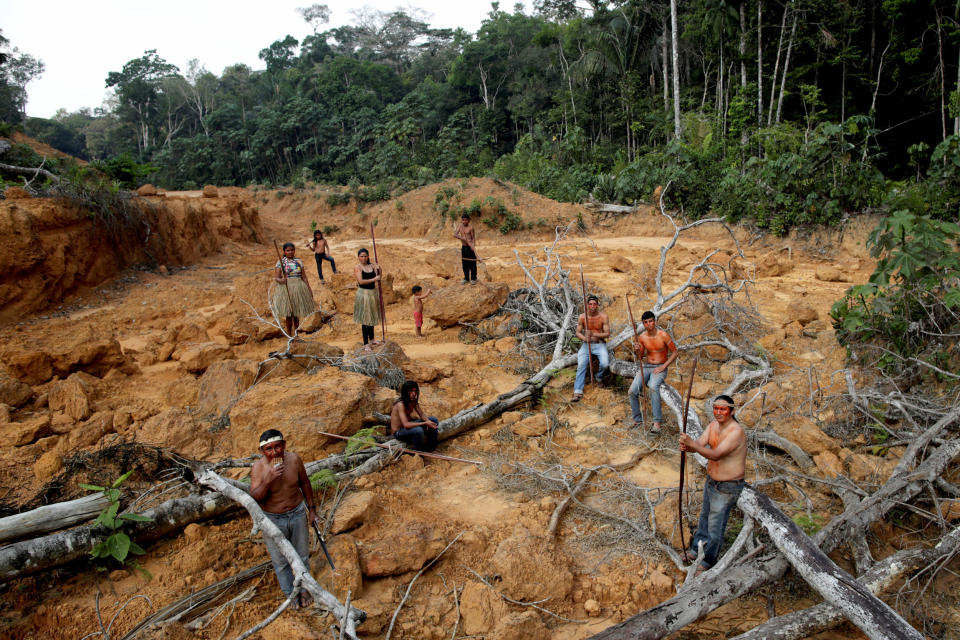
The campaign for an ecocide crime is still in the early stages, though, and for now, the International Criminal Court’s jurisdiction is limited to genocide, war crimes, crimes against humanity and crimes of aggression. When it comes to environmental crimes, the court can only prosecute those that occur during wartime. That means the Brazilian activists’ request for the court to investigate Bolsonaro could be a long shot, legal experts say, especially because national governments have long had control over natural resources within their borders.
But there are also signs that give the activists hope. Some legal analysts think Karim Asad Ahmad Khan, who took over as the court’s new prosecutor on June 16, may consider authorizing the court’s first investigation related to environmental destruction. That’s because Bolsonaro’s alleged crimes are so closely related to the Amazon’s deforestation. Activists and environmentalists hope a decision will come during Khan’s first weeks in office, which coincides with the start of the Amazon’s dry season, when the rainforest is susceptible to fires.
Whatever Khan decides, the Bolsonaro case presents the international court with a novel way to advance legal thinking about environmental destruction and how deforestation can be linked to crimes against humanity, defined legally as widespread or systematic attacks against civilians.
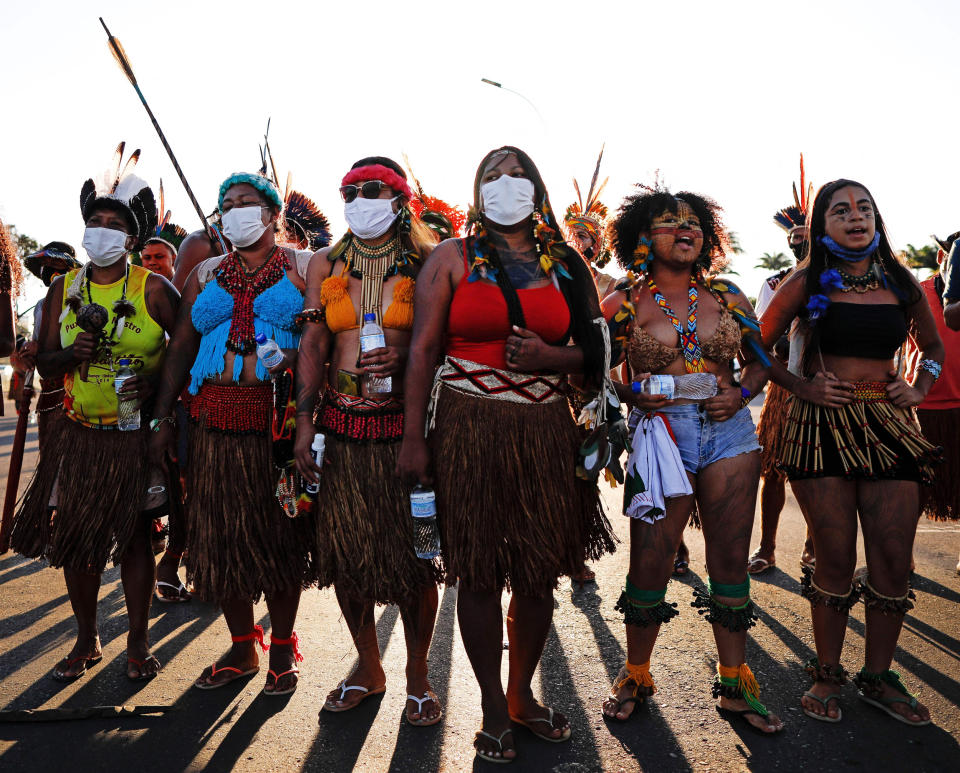
Almir Narayamoga Suruí and Raoni Metuktire, the two Brazilian Indigenous chiefs who requested the international investigation, were not available for interviews, but they said in their request that the stakes for the Amazon are high. The rainforest captures carbon dioxide, a greenhouse gas, making it a core part of humanity’s fight against climate change. Since Bolsonaro took office in January 2019, over 7,700 square miles of the Amazon have been destroyed, an area nearly as large as New Jersey.
Scientists have warned that Bolsonaro’s policies could push the rainforest to an irreversible tipping point, where the rainforest can no longer regenerate itself, which could cause cascading environmental disasters.
“The Amazon rainforest plays an essential role in global climate regulation,” Suruí and Metuktire said in their request. “A point of no return must be avoided at all costs.”
The push for accountability
Suruí and Metuktire filed their request, known as an Article 15 Communication, with the International Criminal Court in January. The request detailed Bolsonaro’s environmental and Indigenous policies and those policies’ ecological harms, and alleged that the policies have led to murders, forced displacement and the persecution of Brazil’s Indigenous population. They argued in the 68-page document that further destruction of the Amazon, 60 percent of which is in Brazil, poses a threat to humankind.
The chiefs’ request followed an earlier Article 15 Communication, submitted in November 2019 by Brazil’s Human Rights Advocacy Collective and the Dom Paulo Evaristo Arns Commission for Human Rights, accusing Bolsonaro of crimes against humanity and genocide for the destruction of the Amazon and harm to Indigenous people. The court has not responded to that request.
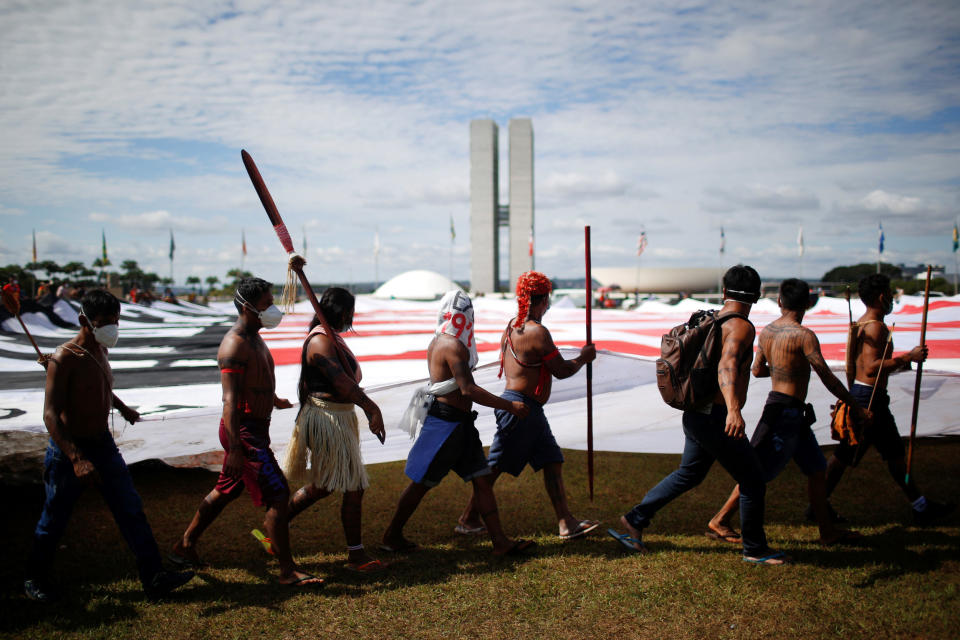
Both of the requests for investigations argue that the livelihoods, culture and survival of Indigenous groups are directly linked to the natural environment. Policies that encourage mass ecological harm are effectively an attack on tribes, the activists and tribal leaders say. They then extend that argument to the rest of humanity, in light of the climate crisis and the Amazon’s key role in storing carbon.
While neither request alleges that Bolsonaro had knowledge of, or was personally involved in, any of the alleged murders or other crimes, they say he and other officials bear ultimate responsibility because their policies and rhetoric encouraged the attacks on Indigenous groups.
Bolsonaro’s environmental record
From his inauguration through last September, Bolsonaro oversaw at least 57 legislative acts that weaken environmental protections, according to a study published in the science journal Biological Conservation, and a slew of budget cuts and restructurings of key agencies that protect and monitor the environment.
The requests to the International Criminal Court note that Bolsonaro has staffed key environmental agencies with former federal police and military officers. “The goal, according to Bolsonaro, is to ‘put an end to the ideological framework of the sector, led by NGOs and entities concerned with the environment,’” Suruí and Metuktire said.
Under Bolsonaro’s administration, enforcement of laws protecting the environment has plummeted, Suruí and Metuktire said. Environmental fines in Brazil decreased 72 percent even as deforestation rates rose to a 12-year high.
His environmental minister, Ricardo Salles, was the main architect of the remaking of Brazil’s regulatory framework, according to the requests. In May 2020, Salles was captured on video advising Bolsonaro to take advantage of the media’s fixation on the Covid-19 pandemic to “push through” environmental rollbacks. Salles resigned on Wednesday, weeks after Brazil’s federal police opened an investigation into his alleged involvement in illegal timber exports. Salles has denied the allegations. His office did not respond to requests for comment.
The impact on Indigenous people
Suruí and Metuktire’s plea comes nearly 50 years after the release of a damning government report that detailed thousands of atrocities — including torture, murder and land theft — carried out with impunity by Brazilian officials against Indigenous peoples during the country’s 1964 to 1982 military dictatorship.
The mentality of that regime, namely that Indigenous people should assimilate and have no land rights, has become ascendant under Bolsonaro, Indigenous groups and lawyers say.
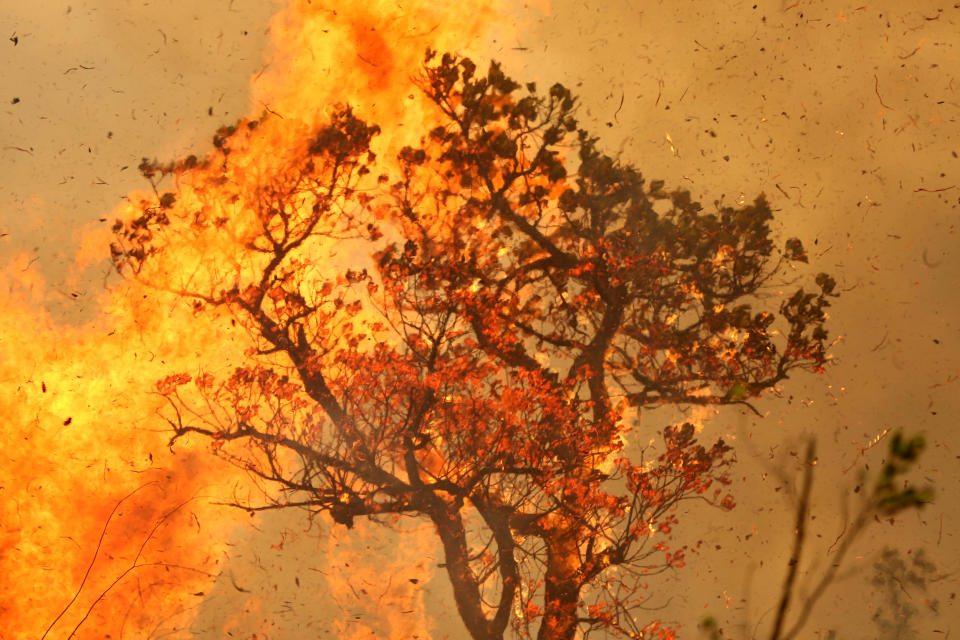
“It’s a completely wrong mentality, but that’s Bolsonaro. He comes from this school that believes Indigenous peoples aren’t peoples,” said Ana Valéria Araújo, a Brazilian attorney who has represented Indigenous groups for over 30 years and is now the executive director of the nonprofit Fundo Brazil. “He sees them as obstacles to development and when there’s an obstacle, you have to remove it.”
Bolsonaro has a history of making anti-Indigenous statements. He has compared isolated Indigenous peoples to animals in a zoo, and in 2020 said that “Indians are undoubtedly changing. …They are increasingly becoming human beings just like us.” In 1998, he lamented that Brazil wasn’t as efficient as the United States, which “exterminated the Indians.” And as president, his administration opened investigations into Indigenous leaders, including Suruí, who have spoken out against his policies, accusing them of defaming him.
Human rights advocates see a direct line between Bolsonaro’s statements and his policies. After he took office, he fulfilled a campaign promise to halt a process of demarcating and protecting Indigenous territories and installed a former federal police officer known to have close ties to the agriculture industry as head of the National Indian Foundation. The government also stopped enforcing environmental and criminal laws that protect Indigenous groups from illegal incursions and exploitation of their land, tribal leaders and human rights activists allege.
These policy changes, coupled with environmental rollbacks, effectively opened up parts of the Amazon long inhabited by Indigenous groups, including uncontacted and isolated tribes, to mining, logging and agriculture. That flood of development activity has led to violence and the destruction of protected Indigenous lands, according to the Article 15 requests.
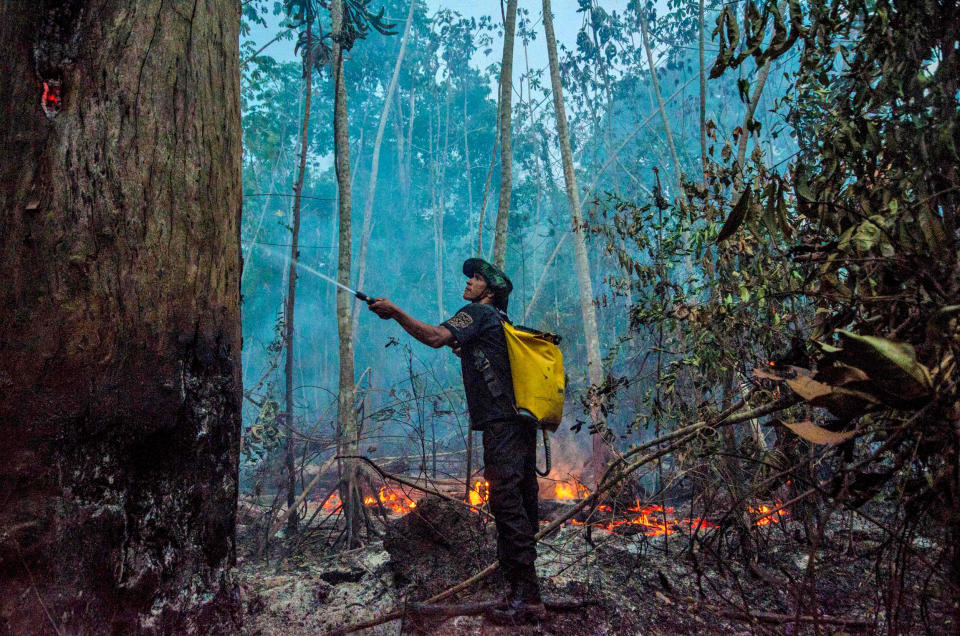
In 2019, when Bolsonaro took office, there were at least 256 cases of property damage, illegal occupation and exploitation of Indigenous land, up from 109 incidents in 2018, according to the Missionary Council for Indigenous Peoples.
In 2019, the murder rate of Indigenous people reached an 11-year high. In one case, detailed in the January request, Emyra Wajãpi, the leader of the Wajãpi people, was stabbed to death by miners who illegally invaded her village. United Nations High Commissioner for Human Rights Michelle Bachelet said the murder was a "worrying symptom of the growing problem of encroachment on Indigenous lands — especially forests — by miners, loggers and farmers in Brazil.”
In public comments shortly after the murder, Bolsonaro reiterated his desire to legalize mining in Indigenous areas.
A deterrent effect
To his supporters, Bolsonaro’s decisive 2018 electoral victory gave him a mandate to carry out his campaign agenda: to enact market-friendly policies, limit the rights of Indigenous groups, repeal environmental regulations and, in his words, “authorize industrial, hydraulic and mining in protected areas.” They also question why Brazil, a developing country, should sacrifice monetizing its natural resources when other nations got rich doing the same thing.
In response to the criticism that he is mismanaging the Amazon, Bolsonaro has said Brazil’s “sovereignty is nonnegotiable,” calling the criticisms evidence of a “misplaced colonialist mindset.” And Boslonaro isn’t the first to open up the Amazon. Administrations across political parties have taken steps to develop the rainforest and curtail environmental protections.
But lawyers and human rights activists say sovereign authority doesn’t make it right or lawful to undermine the rights of Indigenous peoples.
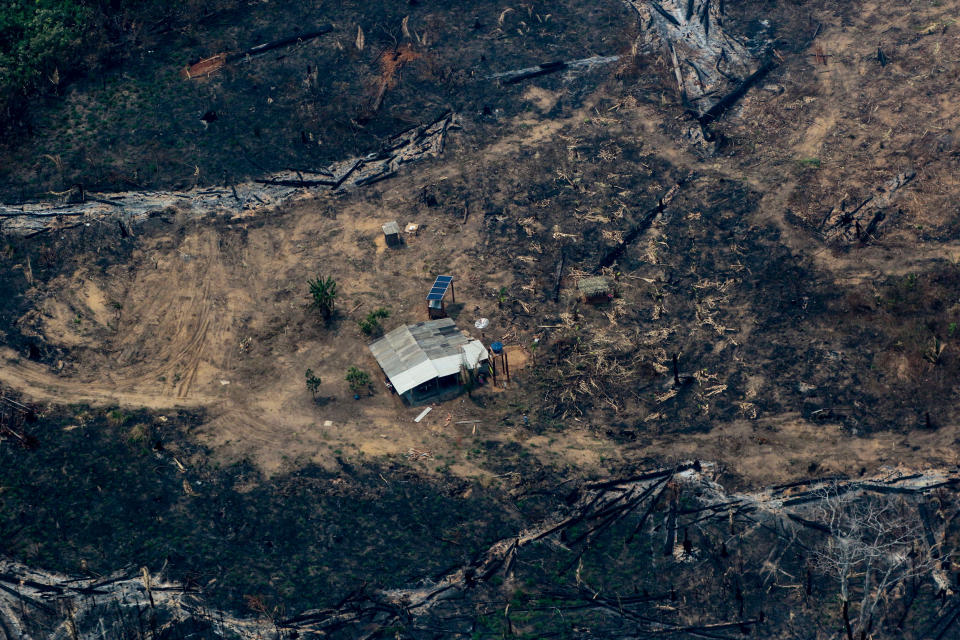
“No one disputes the sovereignty of the president to carry out a policy, but this policy must respect the rights of Indigenous peoples,” William Bourdon, a French lawyer who filed the January request, said in an email. “The right to sovereignty cannot be equated with the right to freely dispose of the lands of Indigenous peoples, much less to have the right of life and death over them.”
In asking the “court of last resort” to investigate their president, Suruí and Metuktire said in their request that Brazil’s justice system is unwilling to carry out a meaningful investigation into the alleged crimes.
Legal experts agree. Ana Carolina Alfinito, a legal adviser with the nonprofit group Amazon Watch, said it’s unlikely that Bolsonaro would face an internal investigation in Brazil; the country’s chief prosecutor is one of his allies. So she and other environmental activists see an international probe as their last and best hope.
“We’ll never have true justice for his crimes if the International Criminal Court doesn’t act,” she said.
Should the international court step into the environmental arena, either through the adoption of an ecocide crime or by taking up a case like Bolsonaro’s, environmentalists and lawyers say that just the prospect of court action could have a deterrent effect on polluting businesses, financial institutions and politicians like Bolsonaro.
“When you destroy an environment, you ultimately destroy your home, culture and people,” said Valérie Cabanes, a French lawyer who helped prepare Suruí and Metuktire’s request. “We are part of nature and we can’t guarantee our fundamental human rights if we don’t protect the rights of nature to exist, regenerate and thrive.”

